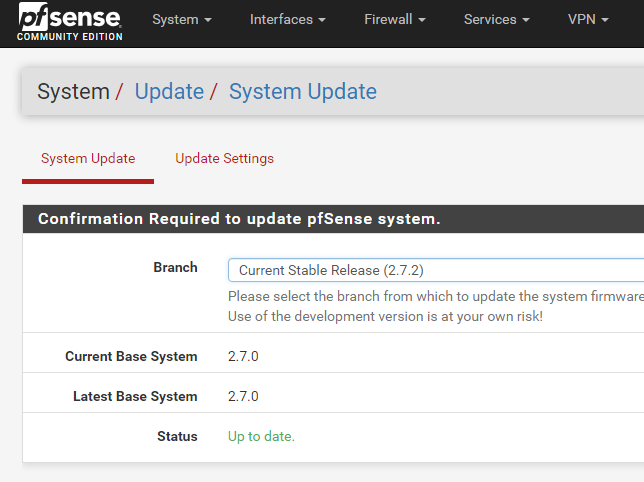
I’m having exactly this same issue. If you try it from the command line, you can get a little more information. It looks in my case like the installation isn’t accepting the certificate that signed the repo. I haven’t had time to look into it further, but I’m probably going to do a fresh install and restore from backup.
Yeah it looks like netgate is doing a real bang up job with the community edition of pfsense. Even though I opted to get a tac lite license I am pretty disappointed in how they are handling the community edition for everyone else. This upgrade seems to be really causing some havoc for a lot of people.
This post might help you.
Will netgate be able to resolve this? Is there a way to update it manually?
The newer version is on a new train. You need to select it from the drop-down menu on from your screenshot in your beginning post.
But whichever branch I pick (either 2.7.0, 2.7.1 or 2.7.2) it still says ‘status - Up to date’
I had to select the new version and then click on the settings tab and then switch back to the update tab.
I had this same issue this morning while trying to upgrade. After rebooting and refreshing the update page several times, I was finally prompted to upgrade to 2.7.2. This was not offered immediately after the reboot, so I am not even sure that rebooting was the fix.
On the plus side, once I upgraded, the system booted up and has been working as expected for the last few hours.
I just downloaded the memstick and iso versions, think this is going to cause the same grief from these installers?
In another thread related to upgrading to 2.7.2 Net-adminuser posted this command: certctl rehash
You can run the command from the diagnostic\command prompt by entering it in the Execute Shell Command line.
I used it on a couple of devices and it allowed me to download and install 2.7.2. Having said that, I have a unit that it didn’t work on. Still investigating.
I fixed mine with some of the steps here
https://docs.netgate.com/pfsense/en/latest/troubleshooting/upgrades.html
As mentioned above “certctl rehash” too
The option to upgrade to + was being offered, but not CE.
I just ran into this issue yesterday while upgrading from 2.6.x to 2.7.2.
In the end it was far easier to backup my config and perform a clean install with 2.7.2. It took less than 5 minutes to be back in total working order.
Something that helped speed things up was that I put my config.xml file in the root of a freshly formatted fat32 usb stick into my pfsense box before performing my first post install reboot. The system simply pulled that in and all was well.
Sometimes its easier to just start fresh than to try and fix whatever was causing the issue in the past.
That’s a good tip, I’ve tried this a few times but it failed for me.
I’ll note the installer asks if you have one to which I said no.
I had the config on a separate stick with nothing else and swapped the installer USB with the one with my config file during the initial reboot. Once things were fully loaded I removed that USB since I didn’t need it trying to overwrite it again if that’s even a thing.
I, too, had this problem trying to upgrade from 2.7.0 to 2.7.2 on Protecli HW. I tried all the suggestions in this thread but nothing worked. Since I had saved multiple backups of my configuration, I felt confident in re-installing from scratch. However, what I decided to do was do a fresh install of 2.7.0 since that is the exact version I had a backup of. I then upgraded without any issues to 2.7.2 and it has been working perfectly for over a day now running my home network.
One thing I was wondering about is whether the underlying file system format could have made a difference. My system was originally configured as 2.4.x and had upgrades to 2.5.x, 2.6.x and 2.7.x without issues. I thought the current file system was changed to ZFS. Not sure if that had anything to do with it.
In any case, kudos to Netgate for the backup/restore system. I have had to use it a few times and it has worked every time. In the end, I only had one system to upgrade and while a fresh install with restore is time consuming, ultimately it was simpler for me than trying to identify the root cause of these upgrade issues.
cert command worked for me ![]()
Thanks, this worked for me as well.
I was stuck on 2.7.0 and could upgrade to 2.7.2 after running certctl rehash as admin via SSH.